Have you gotten an email that says ‘Hello, You are in big trouble’. The email claims that you are now on the radar of an international group of hackers. It alleges that they have recorded you viewing very controversial content and demands a payment in Bitcoin to prevent the distribution of the videos.
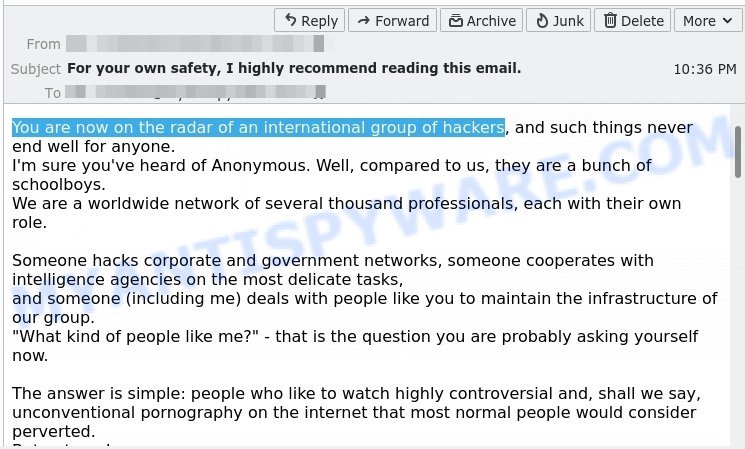
Question: Is it true that my system has been compromised, and do I need to pay them?
Investigation Findings: This type of email is a classic example of a “sextortion scam“. Scammers do not have access to your device or any real compromising material. These threats are designed to create fear and pressure you into making a payment.
Answer: The ‘You Are Now On The Radar Of An International Group Of Hackers’ email is a fraudulent scam. 💡 To safeguard yourself from these scams, do not respond to the emails or make any payments. Update your antivirus software and consider performing a comprehensive scan on your system. Changing your email and device passwords can also improve your security.
Table of Contents
🚨 Is the ‘You Are Now On The Radar Of An International Group Of Hackers’ Email a Scam?
Yes, the email claiming that you are being targeted by an international group of hackers, threatening to release compromising videos unless you pay in Bitcoin, is indeed a scam. 🚫 If you’ve received such an email, exercise extreme caution. The claims are fabricated and designed to instill urgency, misleading you into paying money to the scammer.
A typical “You Are Now On The Radar Of An International Group Of Hackers” scam email reads as follows:
Hello, You are in big trouble.
You are now on the radar of an international group of hackers, and such things never end well for anyone.
I’m sure you’ve heard of Anonymous. Well, compared to us, they are a bunch of schoolboys. unconventional pornography on the internet that most normal people would consider perverted.
By the way, here is your email password: xxxxxxx 🙂
I think you already understand that we would not write to an ordinary man who watches “vanilla” and even hardcore porn – there is nothing special about that.
But the things you’re watching are beyond good and evil.
So after accessing your phone and computer cameras, we recorded you masturbating to extremely controversial videos.
There is a close-up footage of you and a little square on the right with the videos you’re pleasing yourself.
Only money matters to me.
Here is your salvation: you must transfer $1270 in Bitcoin to this BTC cryptocurrency wallet: 1kJLyJJ21q3VtyL9yFP8Jxb5jjTBCq6oF
You have exactly 48 hours to make the payment, so think less, and do more.
As soon as I receive confirmation of the transaction, I will delete all compromising content and permanently disable our computer worm.
Believe me, I always abide by gentleman’s agreements. Even with people who are hardly gentlemen. Because it’s nothing personal, just business.
If I do not receive a payment, I will send all videos of you to every person in your contact list, messengers and email.
Relatives, loved ones, colleagues, friends-everyone you’ve ever been in contact with will receive them.
You understand perfectly well that you will never be able to wash this stain on your reputation.
Everyone will remember you as sick as fuck.
Your life will be completely ruined, and, most likely, only a tightened noose around your neck will be able to save the day.
If you haven’t dealt with crypto before, I suppose it won’t be difficult for you to figure it all out.
Simply type in the “crypto exchange” into the search bar and pay with a credit card. Besides, based on your browser history, you are a savvy user.
When you want to, you can dig into the darkest depths of the Internet, so I’m sure you will be able to find out what is what.
Here is what my colleagues and I should warn you against:
…Do not reply to this email. Do you really think we are so stupid to be tracked by an email address? This is a temporary disposable email.
As soon as I clicked “Send”, it was gone for good.
…Forget about law-enforcement authorities. As soon as I see that you are trying to contact them, the compromising material will be published.
I am sorry that we met in such circumstances. Probably, everything could be different if you had been more careful about what you are doing on the Internet.
Watch yourself from now on, because even such things that you previously considered insignificant can destroy your life in the future like a butterfly effect.
P.S. The countdown is on. The choice is yours
This scam involves fraudsters sending emails that claim they have compromised your privacy, suggesting that they have access to your device and have recorded compromising footage of you. The scammers demand a ransom in Bitcoin to prevent the release of this alleged footage.
However, legitimate cybersecurity experts and organizations confirm that these claims are baseless. No actual access or recording has occurred; the email is designed to scare you into paying the ransom. Scammers often send these emails in bulk, hoping to catch unsuspecting victims.
The alarming spread of these scams has prompted various government and consumer protection agencies, including the FBI and the Better Business Bureau, to issue warnings. These agencies have reported that these scams have been widespread, using similar tactics to exploit individuals’ fears of privacy invasion and public embarrassment.
The fraudulent emails often claim they have observed your online behavior and threaten to share embarrassing footage unless you pay. They provide a Bitcoin wallet address for the payment and set a deadline to increase the urgency and pressure.
🚩 Red Flags to Watch Out For:
To protect yourself, be aware of these warning signs of the scam: 🔍🛡️
- 📧 Threats: Unexpected emails that claim someone has been watching you and demand payment to prevent the release of compromising videos.
- 💸 Ransom Demands: The scam includes demands for payment in Bitcoin, claiming it is the only way to prevent the release of the alleged footage.
- ⏳ Urgency and Imposed Deadlines: These emails impose a tight deadline to pressure you into acting hastily, using fear of embarrassment or reputational damage to coerce you into paying immediately.
- 🔄 No Evidence of Compromise: The email provides no real evidence that any actual observation or recording has taken place.
- 👤 Anonymity of the Sender: Scammers use anonymous email addresses and provide untraceable Bitcoin wallet addresses, making it difficult to verify the source.
- 🔗 Suspicious Claims: Be skeptical of any email that makes extraordinary claims about having watched you and demands for money.
💡 Never respond to such emails or send money. Additionally, ensure your antivirus software is up to date. If you are concerned, run a virus scan on your device and change your email passwords for safety.
Understanding the ‘You Are Now On The Radar Of An International Group Of Hackers’ Email Scam
If you receive an email stating “You are in big trouble“, it’s natural to feel alarmed 🚨. These emails often begin with intimidating statements designed to capture your attention immediately. You might wonder, How could I be on the radar of hackers? In reality, the sender has not accessed your device; their primary aim is to instill fear to provoke a rushed decision.
These emails contain unfounded threats, claiming to have recorded you in private moments 🎥. The language used is meant to be unsettling and to induce shame, making you think, Could this be real?
The scammer may claim to have installed malware on your device, supposedly giving them access to your camera and contacts 💻. However, a major indicator that this is a scam is the complete absence of any genuine proof 🚩. They depend on your fear and embarrassment to coerce you, not on actual technical capabilities.
The email typically concludes with a ransom demand 💰, requesting payment in Bitcoin to keep the sender anonymous. The scheme pressures you to pay quickly, under the threat of distributing the alleged recordings to your contacts. However, paying does not ensure your privacy and could potentially mark you for further scams.
Upon receiving the email, you might question, Am I truly at risk? or Can this person actually do what they claim? Generally, these threats are completely made-up; they manipulate your fears without any real foundation.
What should you do? It’s crucial not to respond to the scammer or send any money. Instead, focus on boosting your online security: update your passwords, make sure your devices are secured, and consider reporting the incident to authorities if the scam involves threats or extortion 🔐. Such incidents emphasize the importance of being alert and maintaining strong online security practices.
This scam capitalizes on instilling fear and urgency to deceive you. If you receive an email like this, do not interact with the scammer or transfer any money. Simply delete the email. Also, safeguard your computer with updated anti-virus software, and use strong, unique passwords for all your accounts to help prevent falling victim to such scams.
Examples of such scams
Scammers have developed a variety of tactics to intimidate and exploit unsuspecting individuals. Here are a few common examples:
🔒 Your Private Information has been Stolen Email Scam
Here, the scammer will claim they’ve stolen sensitive information from you and threaten to release it unless you pay a ransom. They rely on the scare factor, hoping you’ll pay to protect your reputation, even though they likely have no data at all.
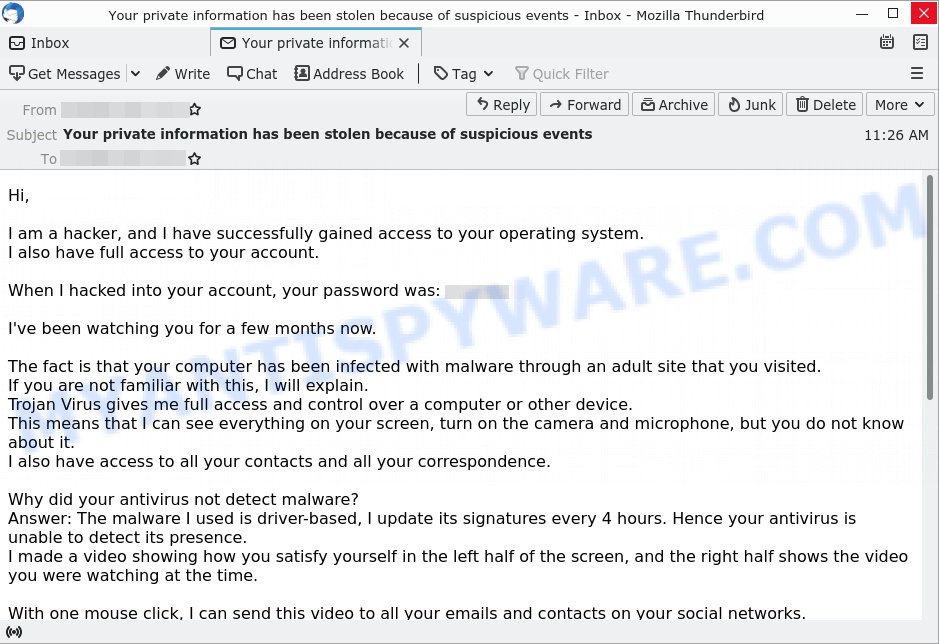
📹 I RECORDED YOU Email Scam
In this scam, the sender claims to have control over your camera and alleges they have recorded you during private moments. They typically demand payment to keep the footage private. Beware: this is a bluff to get you to pay up out of fear.
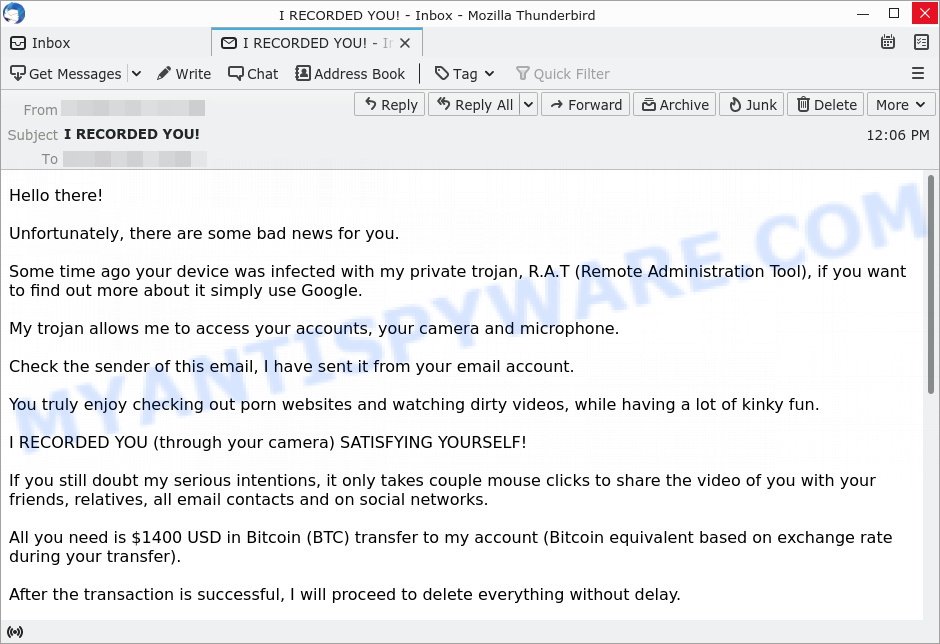
💼 I am a professional hacker EMAIL SCAM
Posing as a hacker, the sender of this email might say they’ve infiltrated your system. They may even claim they have proof of embarrassing activity and will publish it unless you send them money. Remember, a real hacker wouldn’t announce their presence—it’s a tactic to pressure you into paying.
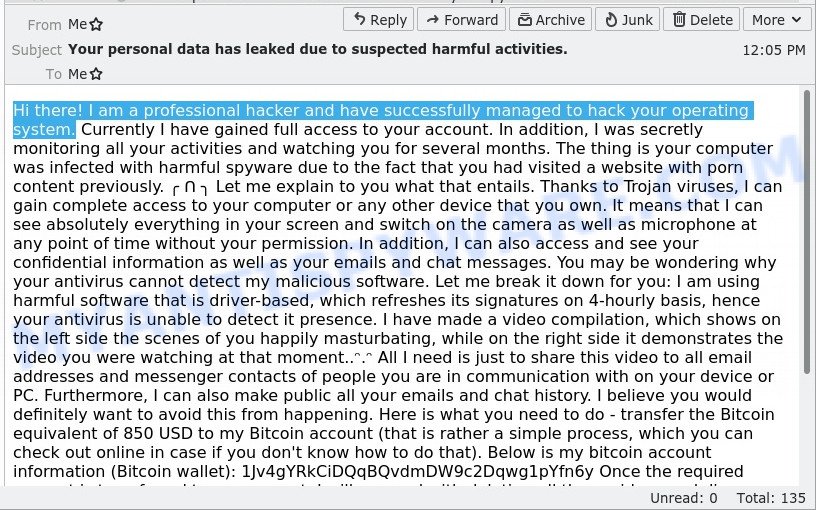
Each of these scams plays on fear and urgency to trick you into acting against your best interest. Always approach such emails with skepticism, verify your security, and do not engage with the scammers.
Should you send the money?
No, don’t give the scammer any money. It’s a scam, and giving them money will only encourage them to continue their criminal activities. Plus, if you pay once, they might target you again. To keep your personal information safe, always use strong and unique passwords for each of your accounts, enable two-factor authentication for an extra layer of security, and keep your computer’s antivirus software up to date. If you receive an email like this, it’s important to report it to the authorities and your email provider.
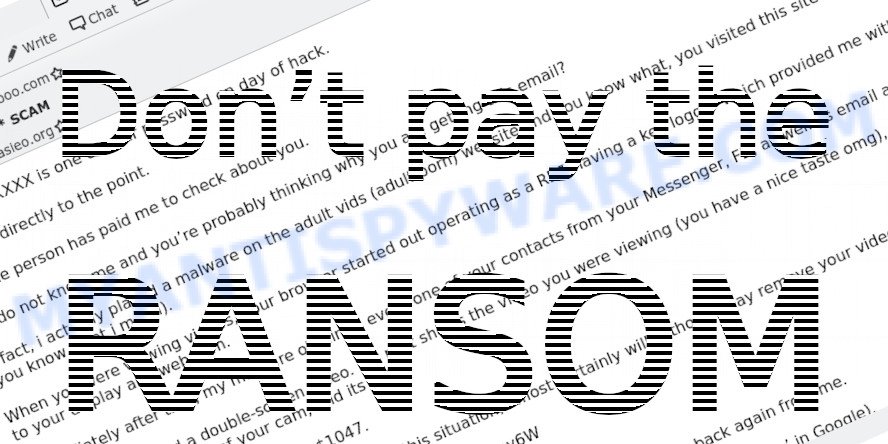
What to Do if You Get This Scam Email
Getting an email that says someone hacked your devices and has compromising information can be scary, but there are easy and safe ways to handle it.

Here’s what to do:
First, stay calm. The email is meant to scare you and make you act without thinking. Remember, it’s just a scam to make you feel afraid.
Don’t pay them. Paying won’t make the problem go away. It only shows the scammer that you are an easy target for future scams.
Don’t reply to the scammer. Responding can give them more information about you and confirm that your email is active, which could lead to more scams.
If the email mentions a password you recognize, check where it came from. Use sites like haveibeenpwned.com to see if your email or passwords have been part of a data breach.
Then, change your passwords. Use strong, unique passwords and set up two-factor authentication where you can.
For safety, run a full security scan on your device. The email’s claims about malware are usually false, but it’s good to make sure your system is clean.
Report the email to the authorities (like the FTC). Reporting helps with investigations and can stop these scams from happening to others.
Finally, tell others. Let your friends, family, and coworkers know about this scam so they can avoid it too. Sharing this information makes everyone safer.
Threat Summary
| Name | You Are Now On The Radar Of An International Group Of Hackers Email Scam |
| Type | Sextortion/Scareware |
| Ransom Amount | $1270 in Bitcoin |
| Bitcoin Address | 1JD7ozyCXkEforfPRv7m5WCFoAEf5BpMHQ,1kJLyJJ21q3VtyL9yFP8Jxb5jjTBCq6oF |
| Fake Claims | Claims of having recorded the recipient masturbating to controversial videos via hacked phone and computer cameras, possession of video evidence, threat to distribute these to contacts |
| Damage | Psychological distress, potential financial loss if ransom is paid, privacy invasion |
| Distribution | Email campaigns with shock-inducing, personalized threats claiming remote camera access and surveillance |
| Tactics | Accusations of viewing illegal content, inducing fear of public shame and legal repercussions, creating urgency with a 48-hour payment deadline |
| Variations | Different ransom demands, varying narrative details, various impersonated hacker group identities |
| Prevention Tips | Do not engage or respond; enable two-factor authentication; use strong, unique passwords; cover webcams when not in use; keep devices secure with updated antivirus software; report the scam |
| Reporting Info | Forward to the Anti-Phishing Working Group at reportphishing@apwg.org; Report to Internet Crime Complaint Center (IC3) if in the US; Inform friends and family to raise awareness; Monitor accounts for suspicious activity |
Conclusion
The “You Are Now On The Radar Of An International Group Of Hackers” email is a type of sextortion scam that uses fear to try to get money from you. The scammer will falsely claim they’ve hacked into your devices and recorded you watching sensitive content. They threaten to share these made-up recordings with your contacts unless you pay them in Bitcoin. Remember, these threats are not real and are meant to scare you into paying.
Bottom Line: Ignore these emails. The best defense is to not interact with the sender and make sure your devices are secure. 🛡️💻
Stay aware and use your judgment; any email that makes you feel scared or seems very pushy is probably a scam. 🤔
















